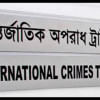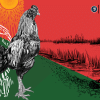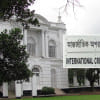Search for info on Pakistani POWs
The investigation agency of the International Crimes Tribunal has formed a special committee to gather information about Pakistani prisoners of war (POWs) who were allegedly involved in war crimes in Bangladesh during the 1971 Liberation War.
The five-member body, led by a deputy director of the agency, was formed on Monday, and it will collect information from across Bangladesh, agency's Coordinator Abdul Hannan Khan said at a press briefing yesterday.
He, however, said they were yet to decide whether they would launch any formal investigation against the Pakistani soldiers.
The committee has been formed at a time when calls for putting 195 Pakistani POWs, repatriated following a tripartite agreement in 1974, on trial are getting louder and experts finding no legal bar to bringing them to book.
On December 27 last year, Hannan at a press conference had said the agency would start a probe against the POWs whenever it found a “suitable environment” and “directives from the high-ups.”
He had also said that as another country -- Pakistan -- was involved in the matter, they needed to get the government's directives before starting the probe.
Yesterday, Hannan told reporters at agency's Dhanmondi office that the trial of the POWs is now a “national demand” and names of several Pakistani army officials surfaced during investigations into other war crimes cases.
Besides, several Pakistani army officials were also implicated in cases filed under the Collaborator Act- 1972 immediately after the war, he said.
“I have formed a committee a few days ago to collect preliminary information about Pakistani Prisoners of War... and the committee has already started its work,” he said.
The body is led by Motiur Rahman, a deputy director of the agency, he added.
After the briefing, The Daily Star asked Hannan whether the agency had got government's directive to start investigation against the POWs.
He replied, “No, the issue [trial of POWs] has become a national demand and that's why we just want to make some progress in the work. The committee has been formed for this.”
He reiterated that government approval would be required for starting any formal investigation against Pakistani soldiers.
Meanwhile, the special committee held its first meeting on Tuesday and it was attended by all the five members, Motiur Rahman told The Daily Star yesterday.
“In the meeting, we have discussed how we will start our work and what kinds of documents we will have to collect,” he said.
After independence, Bangladesh collected specific evidence of genocide against the 195 Pakistani army personnel, who were in Indian custody as POWs.
After a long-drawn stressful negotiation over the POWs, a tripartite agreement was signed in Delhi in April, 1974 in which Bangladesh said “having regard to the appeal of the prime minister of Pakistan to the people of Bangladesh to forgive and forget the mistakes of the past,” Bangladesh decided not to proceed with the trial as an act of clemency.
However, legal experts say there is no legal bar to trying the 195 Pakistanis and there has also been a longstanding demand to try them at the ICT, which is now trying their local collaborators.
The International Crimes Tribunal-2, in its 2013 judgment in the case against Jamaat leader Abdul Quader Mollah, had said, “Amnesty shown to 195 listed war criminals are opposed to peremptory norms of international law. It is to be noted that any agreement and treaty amongst states in derogation of this principle stands void as per the provisions of international treaty law convention [Article 53 of the Vienna Convention on the Law of the Treaties, 1969].”
“Despite the immunity given to 195 listed war criminals belonging to the Pakistan armed forces on the strength of 'tripartite agreement', the Act of 1973 [International Crimes (Tribunals) Act-1973] still provides jurisdiction to bring them to the process of justice,” said the tribunal.
The demand of trying the POWs has been intensified after Pakistan has recently denied committing any war crimes in Bangladesh in 1971.
About three million Bangalees were killed and a quarter million women raped by Pakistan army and their local collaborations. Besides, about 10 million people had to take refuge in India during the war.

 For all latest news, follow The Daily Star's Google News channel.
For all latest news, follow The Daily Star's Google News channel. 








Comments